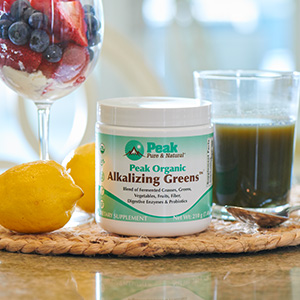Get Easy Health Digest™ in your inbox and don’t miss a thing when you subscribe today. Plus, get the free bonus report, Mother Nature’s Tips, Tricks and Remedies for Cholesterol, Blood Pressure & Blood Sugar as my way of saying welcome to the community!
Why healthy eating isn’t a one-size-fits-all solution

There’s no denying that food is a powerful tool for maintaining or reclaiming optimum health. But how come some people try a certain diet and experience dramatic results while others barely notice a difference in their weight, health and well-being on the exact same diet?
One person can go paleo and send their autoimmune disease into remission, while someone else still struggles with symptoms. Another person can try a Mediterranean diet and lower their blood pressure so much they don’t need medication anymore, while someone else still needs those ACE inhibitors.
That means, as powerful as diet is in some cases, it’s also extremely unpredictable. There’s no universally healthy diet that everyone can depend on. And we need to figure out exactly why that is if we ever want to use diet to its full health-giving potential.
Luckily, a new study is taking us one step closer to figuring out how to make healthy eating work for everyone…
Bacteria’s behind your diet’s effectiveness (or lack thereof)
Researchers from Murdoch University and the Imperial College London just shed some light on why people respond differently to the exact same diet.
In their study, researchers asked a group of healthy adults to follow four different diets. Some of the diets were healthy and some were the equivalent of a fast-food diet. Researchers tracked their metabolism while they ate these different diets, and here’s what they found…
Even when people ate the same diet as one another, they had different metabolic responses. While eating the same number of calories, some people excreted more calories in their urine than others. The metabolic pathways activated by the diets varied between people too. Some had different blood sugar levels. Many had different chemicals in their urine… and this was where things got really interesting…
Related: Control your metabolic thermostat and lose weight with probiotics
The different chemicals in their urine were generated by different gut bacteria. It’s already widely known that everyone has a unique microbiome that influences their health. But the variety of chemicals in people’s urine indicates that these bacteria impact how different foods are digested, which affects what nutrients your body absorbs and how your body stores energy. The unique chemicals those bacteria release can also have far-reaching effects on your body, including how full or hungry you feel. Researchers think this could determine how effective your diet is at maintaining or restoring your health.
The good news is, researchers may be able to use the information they gathered to develop personalized nutrition programs tailored to people’s unique microbiomes and other individual factors (like genes) that help them lose weight and/or stay healthy.

Peak Organic Alkalizing Greens™
Formulated with special blends of Organic Greens, Fruits and Vegetables, Fiber, Digestive Enzymes, and Probiotics to promote healthy pH balance for Immune and Digestive Support.
“This is a real paradigm shift in personalized nutrition research — for the first time we have tools that can rapidly evaluate the diet-microbiome interactions that affect individual responses to complex diet patterns in the real world,” said Professor Gary Frost the Head of Nutrition Research at Imperial College.
How to get your own personalized nutrition program
There’s still a lot of research that needs to be done before we master the art of personalized nutrition. But there are already companies offering personalized nutrition plans based on a variety of factors, including your genes and microbiome. One of these companies is Viome. There’s also a Mayo Clinic-affiliated program called DayTwo designed specifically for people with type 2 diabetes.
These are just a few examples, but more personalized nutrition companies and programs are popping up every day. There are a lot of studies (like the one I discussed above) that support the work they’re doing. But be warned… personalized nutrition science is still in its infancy. So, if you do decide to sign up for a specific program, make sure you do your research on the company and their approaches to personalized nutrition to make sure you get the most health benefits for your money.
In the meantime, there’s plenty of research that a diet high in probiotic and prebiotic foods can help can contribute to a healthier, more balanced gut microbiome.
Editor’s note: Did you know that when you take your body from acid to alkaline you can boost your energy, lose weight, soothe digestion, avoid illness and achieve wellness? Click here to discover The Alkaline Secret to Ultimate Vitality and revive your life today!
Sources:













